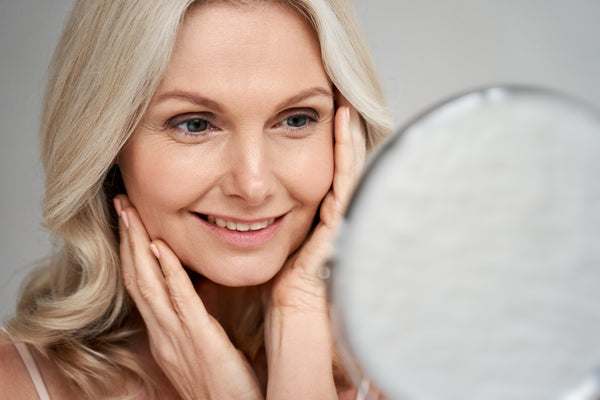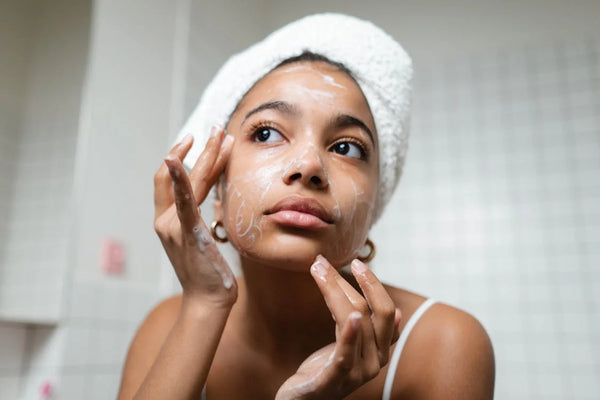
Clogged skin pores are common and inevitable. There is a plethora of advice online for how to remedy them. Which option is best for you and your skin type?
Most online options recommend using commercial skincare products for clogged pores. Did you know that Mother Nature provides everything we need to not only rid ourselves of clogged pores, but to prevent them too?
Pores are tiny openings in the surface of the skin. Sometimes they’re visible, but most often they’re not. Pores clog when dead skin cells get trapped in the pore, instead of being shed from the skin.
Pores can also collect excess of an oily, waxy substance called sebum. At normal levels, sebum is good; it coats and moisturizes the skin, protecting it from toxins in the environment.
Excess sebum and skin cells can clog pores. Eventually the sebum is exposed to the air and becomes a blackhead or other various forms of acne including white heads and pustules.
You should not squeeze pores that have acne. In the short term it may rid your skin of the visible signs of acne, but you can damage skin tissue and enlarge the pores. This could cause infection.
Commercial skincare products, which are made with synthetic chemicals, dry out your skin and can even cause more inflammation and acne.
Natural skincare products with calcium bentonite clay and essential oils offer a safe way to unclog pores and keep them from getting clogged again. Additionally, these natural skincare products provide natural vitamins and minerals to give your complexion the healthy glow you’re looking for.
Clay is one of the most ancient cosmetic products. A tablet from 2200 BC, which is believed to be one of the oldest medical manuscripts, states that creating “plasters made of mud and herbs” is as important as washing and bandaging a skin wound. In addition, archeologists have uncovered Greek and Roman engravings showing people applying clay to their faces or even bathing in it.
The longevity of this skin therapy lends credibility to its effectiveness. The key is its non-synthesized chemical makeup.
Clay, a natural type of soil which can’t be replicated in a lab, is rich in vitamins and minerals, making it one of the most beneficial and healthifying substances to slather on your skin.
All clay is volcanic, created from highly charged ash forcefully spewed forth during a volcanic eruption. Most volcanic clays have a high ionic charge. This gives them their adsorptive and absorptive capacities. These two capacities underlie the detoxifying power of clays.
When calcium bentonite clay is applied to the skin, its cationic exchange properties adsorb (i.e., attract) the molecules and ions of the toxins and chemically attach to them. The clay then absorbs these toxins as it takes in water.
So, a bentonite clay mask flushes your skin pores from the inside out. In other words, bentonite clay “sticks” to a toxin, absorbing its harmful components into the clay, which will then be washed away.
This process of detoxification is so scientifically reliable that scientists and hazardous response experts poured bentonite clay into the Chernobyl reactors after the nuclear meltdown.
Calcium bentonite clay pulls impurities from your skin and replaces them with beneficial trace minerals. It contains natural trace minerals such as calcium and magnesium, which work together to reduce skin inflammation, including acne. Calcium bentonite clay also has other skin-benefitting minerals such as copper, and zinc.
Studies show that bentonite clay may help with allergic skin reactions to poison ivy and poison oak, skin irritations such as diaper rash, and skin infections.
Pascalite clay is a type of bentonite clay. It does not swell when mixed with liquid, which makes it unique from other bentonite clays. It still absorbs like a sponge, but it doesn’t increase in size. This makes it easy to use. And like all bentonite clays, this clay holds the powerful energetics of volcanic ash, but is gentle for all skin types.
Pascalite clay has its own unique history. It is found near the famous Bighorn Medicine Wheel in Wyoming. Pascalite clay is mined underground during the summer and then solar dried at the mountain site during the winter. Some say that medicine wheels are located in vortex areas where earth energies strongly surface, and that perhaps this is the source of pascalite’s intense energy.
Pascalite clay benefits the skin in numerous ways. Pascalite clay skin poultices are an excellent choice when you want to deep-clean your pores. The cationic exchange properties adsorb and absorb impurities, unclogging your pores as it draws impurities from your skin.
This detoxification combined with the synergistic effects of trace minerals will leave you with a brighter, smoother, and more radiant complexion.
Calcium bentonite clay can be used as both a mask and a cleanser. Applying calcium bentonite clay in the form of a poultice provides your skin with the medicinal properties of calcium bentonite clay.
When you combine the poultice with water, it will become a paste. You can use the paste as a mask or a cleanser. To use the poultice as a mask, apply it thickly to your skin, let it sit for 15-20 minutes, then rinse with warm water or a damp washcloth.
Increase the benefits by mixing poultice with a tonic or a hydrosol. This will further clean your pores and nourish your skin.
Clays are an effective natural choice for cleansing the pores. If you couple clay skin treatments with essential oils such as tea tree oil and hazelnut oil, you’ll be giving your skin an extra nutritive boost. And yes, of course, our poultice includes both of these ingredients.
Essential oils deep clean and protect the skin through their astringent, antibacterial, and anti-inflammatory properties.
Astringent substances, such as tea tree oil and hazelnut oil, constrict skin cells. This reduces pore size. Minimizing pore size prevents clogged pores. This is why astringents are commonly included in an acne skin regimen.
Commercial astringents contain alcohol, which can dry out or irritate your skin. Natural astringents such as tea tree oil and hazelnut oil do not. They simply clean the excess oil from pores and close the pores to prevent acne.
Small studies have shown that tea tree oil fights acne better than a placebo. Tea tree oil also works as well as commonly-used chemical astringents such as benzoyl peroxide and salicylic acid. More importantly, tea tree oil doesn’t irritate and dry out your skin.
Hazelnut oil’s astringent properties differ from those of tea tree oil, but they are just as effective. Hazelnut oil contains tannins, which work as an astringent by shrinking proteins within skin cells. Tannins are the natural astringent that creates the dry, puckery feeling after tasting red wine, strong tea, or unripened fruit.
Hazelnut oil is occlusive, which means it creates a physical barrier on your skin to prevent moisture loss. Most occlusive skin products are greasy, but hazelnut oil is not. It is an exceptional acne-fighting moisturizer if you have oily, acne-prone skin.
Clogged pores often contain bacteria that can cause acne. Both tea tree oil and hazelnut oil have antibacterial properties that eliminate bacteria.
Tea tree oil has antiseptic properties that cleanse the pores, ridding them of bacteria, fungi, and other impurities. Tea tree oil improves skin conditions such as nail fungus, athletes foot, and lice.
The ethanol extract present in hazelnut oil gives it its antibacterial properties. Ethanol exhibits antibacterial activity against Staphylococcus aureus, the bacteria known to cause acne.
Anti-inflammatory skin products help soothe the inflammation caused by breakouts. The irritation caused by acne can propagate more acne so it's important to have a product to minimize inflammation.
Tea tree oil and hazelnut oil provide this benefit. For example, tea tree oil helps with adverse reactions to nickel. Nickel, which is commonly found in jewelry, can cause inflammation and irritation that may lead to scarring. Applying tea tree oil to the inflamed or irritated skin can prevent scar tissue from forming. The ethanol extract in hazelnut oil boosts the production of iron, which increases the skin’s ability to fight bacteria.
As with all skin products, always conduct a patch test first. Watch for signs of adverse effects including redness, itching, swelling, or a burning sensation.
Apply hazelnut oil and tea tree oil to clean skin. You can spot-treat troublesome spots by using a cotton swab on those specific areas. Or you can massage the oil into a larger area.
Remember that hazelnut oil is a non-greasy moisturizer because it quickly penetrates the skin to soothe dryness and irritation. Simply apply a thin layer to your face after cleansing.
Tea tree oil is as versatile as it is beneficial. It’s also quite potent, so try combining it with carrier oils to dilute its concentration. Hazelnut oil is an excellent pairing because it is both a moisturizer and carrier oil. Other carrier oils include rosehip, almond, or coconut oils.
You can also apply tea tree oil and hazelnut oil (via our poultice) as a cleansing serum. Combined with other essential oils such as helichrysum, tea tree, and german chamomile, this serum/poultice is a powerful natural formula for deep-cleaning. Simply massage into the areas of concern. It will absorb quickly. You can use this combination day or night.
Comments will be approved before showing up.


